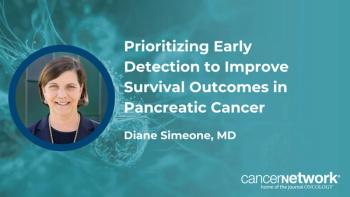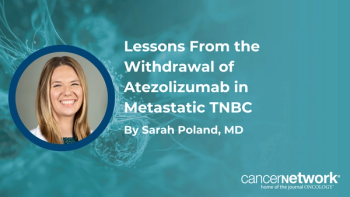
- ONCOLOGY Vol 21 No 6
- Volume 21
- Issue 6
Adjuvant Therapy for Pancreatic Cancer: No 'Definite' Standard
Despite attempted curative resection of localized adenocarcinoma of the pancreas, most patients experience a recurrence and die of their disease. The Gastrointestinal Tumor Study Group, European Organisation for Research and Treatment of Cancer, and European Study Group for Pancreatic Cancer trials have suggested the benefit of adjuvant therapy. However, the relatively few randomized trials available have not established a definite standard of care due to study limitations. Although these trials, and the recently published Charité Onkologie (CONKO)-001 trial, have shown a definite advantage of adjuvant chemotherapy, the most effective chemotherapy and the role of radiation therapy remain unclear. This review will discuss the data available from reported trials of adjuvant and neoadjuvant therapy in pancreatic cancer, address the issues leading to the ongoing controversies, and consider future directions for clinical trials.
In this issue of ONCOLOGY, Drs. Keedy and Berlin review the historical and ongoing trials pertinent to the question of the potential benefit of adjuvant therapy for pancreatic cancer. Based primarily on the results of two recent European trialsEuropean Study Group for Pancreatic Cancer (ESPAC)-1 and Charité Onkologie (CONKO)-001the authors conclude in their abstract that there is a "definite advantage to adjuvant chemotherapy" and that the "role of radiation therapy remain[s] unclear."[1-3] To rely primarily on the European trials mentioned above to draw these conclusions is hazardous, as the results (particularly for ESPAC-1) are highly controversial.
Specific criticisms of the design and conduct of ESPAC-1 that undermine its results have been elegantly articulated in the literature.[4-7] The lack of centralized quality assurance for radiation fields and doses resulted in only 75% of patients receiving the prescription dose of 40 Gy. Some patients received less, while others received up to 60 Gy. The allowance for "background therapy" including chemotherapy or chemoradiation could have had an impact on future randomized treatments and potentially influenced the results.
ESPAC-1 is the only randomized phase III trial to suggest that radiation therapy, when given with fluorouracil (5-FU) chemotherapy, results in decreased survival. Both the Gastrointestinal Tumor Study Group (GITSG) and European Organisation for Research and Treatment of Cancer (EORTC) trials suggested benefits, not detriments.[8-10] The reasons for the inferior radiation results in ESPAC-1 are unclear, and the fact that the median overall survival (15.5 months) for patients receiving surgery alone were much better than that seen in the GITSG (10.9 months) or EORTC (12.6 months) trials is also unexplained. Thus, the unique results of ESPAC-1 need further validation before any conclusions can be drawn regarding the role of chemotherapy or chemoradiation in the adjuvant setting.
Interpreting CONKO-001
The potential benefit of radiation therapy in the adjuvant setting was not addressed by the CONKO-001 trial, as neither arm included radiation therapy. This trial demonstrated an improvement in median disease-free survival, but no significant change in median overall survival (22.1 vs 20.2 months).[3] Most of the randomized phase III trials evaluating adjuvant therapy for pancreatic cancer have utilized overall survival as the primary endpoint.[1,2,8,9,11] To conclude a "definite advantage" to adjuvant chemotherapy, overall survival would seem a more appropriate endpoint. While it is possible that with greater power the CONKO-001 trial may have resulted in an improvement in overall survival with adjuvant gemcitabine (Gemzar), this has yet to be proven. CONKO-001 is the only trial that has evaluated gemcitabine alone vs observation. Prior phase III trials evaluating 5-FU-based regimens vs observation have not uniformly supported a benefit to adjuvant chemotherapy.[11,12]
'Modern' Chemoradiation
Drs. Keedy and Berlin offer in their conclusions that "while no data have proven that modern chemoradiation is ineffective as part of adjuvant therapy for pancreatic cancer, lack of proof against a regimen does not justify its routine use." We will interpret "modern chemoradiation" to be daily fractionated radiotherapy rather than historical split-course radiation therapy. The historical GITSG and EORTC trials suggested a benefit to chemoradiation. However, the Radiation Therapy Oncology Group (RTOG) 97-04 study stands alone as the only randomized cooperative group trial incorporating "modern" radiation therapy delivery in its design.
This trial compared a 5-FU-based chemoradiation regimen with a gemcitabine-based chemoradiation regimen and demonstrated an improvement in median survival for patients with pancreatic head cancers receiving gemcitabine-based adjuvant chemoradiation.[13] The RTOG trial was the first phase III trial in pancreatic cancer to include prospective quality assurance for all patients, with central review of the preoperative abdominal computed tomography (CT) scan and radiation treatment fields prior to the initiation of therapy. Centralized quality assurance has been demonstrated to influence the outcome of patients in RTOG 97-04, which underscores the impact that the lack of quality assurance may have had on historical chemoradiation trials.[14]
The RTOG 97-04 and CONKO-001 trials represent the modern phase III evaluation of gemcitabine-based treatment in the adjuvant setting. Unfortunately, the results of RTOG 97-04 cannot be directly compared with the CONKO-001 results because of fundamental differences in treatment design and patient characteristics. CONKO-001 had more favorable patients than RTOG 97-04, with 83% of patients undergoing R0 resections (vs 40%) and all patients having a CA19-9 < 2.5 times the upper limit of normal (vs no upper limit). Nevertheless, the CONKO-001 trial suggested a 2-month trend toward improved overall survival with gemcitabine alone, and the results of RTOG 97-04 demonstrate a 4-month trend toward improved overall survival when gemcitabine was added to radiation therapy in patients with pancreatic head cancers.
Conclusions
At present, it is premature to conclude that there is a "definite" advantage to adjuvant chemotherapy in pancreatic cancer. However, gemcitabine has been demonstrated to be more effective than 5-FU when combined with radiation therapy in the adjuvant setting or when given as monotherapy in the metastatic setting.[13,15] The only randomized trial testing the advantage of gemcitabine over observation in the adjuvant setting resulted in a trend toward improved overall survival with gemcitabine.[3] At this time, no "definite" standard has been established in the adjuvant treatment of pancreatic cancer, and given the continued poor outcomes of patients with our best therapies, a clinical trial should be considered the preferred treatment. Based on the promising data from the CONKO-001 trial and RTOG 97-04, future trial designs should build on a gemcitabine backbone and explore the additive benefits of biologic therapies and further refinements in radiation therapy techniques. Radiotherapy can be expected to enhance adjuvant effects in this context based on patterns of failure, experience with chemosensitization, and prior 5-FU-based trials.[16-20] Facile comments about an unproven role for this modality overlook this extensive data set and obscure the reality that CONKO-001 does not address the use of radiotherapy. The optimal combination and sequencing of chemotherapy and radiation therapy has yet to be defined and is the subject of ongoing trials.
Michael C. Garofalo, MD
Ross A. Abrams, MD
William F. Regine, MD
Disclosures:
The authors have no significant financial interest or other relationship with the manufacturers of any products or providers of any service mentioned in this article.
References:
1. Neoptolemos JP, Dunn JA, Stocken DD, et al: Adjuvant chemoradiotherapy and chemotherapy in respectable pancreatic cancer: A randomized controlled trial. Lancet 358:1576-1585, 2001.
2. Neoptolemos JP, Stocken DD, Friess F, et al: A randomized trial of chemoradiotherapy and chemotherapy after resection of pancreatic cancer. N Engl J Med 350:1200-1210, 2004.
3. Oettle H, Post S, Neuhaus P, et al: Adjuvant chemotherapy with gemcitabine vs observation in patients undergoing curative-intent resection of pancreatic cancer. JAMA 297:267-277, 2007.
4. Choti MA: Adjuvant therapy for pancreatic cancer-the debate continues. N Engl J Med 350:1249-1251, 2004.
5. Morris SL, Beasley M, Leslie M: Chemotherapy for pancreatic cancer [letter to the editor]. N Engl J Med 350:2713, 2004.
6. Crane CH, Ben-Josef E, Small W: Chemotherapy for pancreatic cancer [letter to the editor]. N Engl J Med 350:2713-2714, 2004.
7. Bydder S, Spry N: Chemotherapy for pancreatic cancer [letter to the editor]. N Engl J Med 350:2714, 2004.
8. Gastrointestinal Tumor Study Group: Further evidence of effective adjuvant combined radiation and chemotherapy following curative resection of pancreatic cancer. Cancer 59:2006-2010, 1987.
9. Klinkenbijl JH, Jeekel J, Sahmoud T, et al: Adjuvant radiotherapy and 5-fluorouracil after curative resection of cancer of the pancreas and periampullary region: A phase III trial of the EORTC gastrointestinal tract cancer cooperative group. Ann Surg 230:776-782, 1999.
10. Garofalo MC, Regine WR, Tan MT: On statistical reanalysis, the EORTC trial is a positive trial for adjuvant chemoradiation in pancreatic cancer. Ann Surg 244:332-333, 2006.
11. Bakkevold K, Arnesjo B, Dahl O, et al: Adjuvant combination chemotherapy (AMF) following radical resection of carcinoma of the pancreas and papilla of Vater-results of a controlled, prospective, randomized multicentre study. Eur J Cancer 29A:698-703, 1993.
12. Takada T, Amano H, Yasuda H, et al: Is postoperative adjuvant chemotherapy useful for gall bladder carcinoma? A phase III multicentre prospective randomized controlled trial in patients with resected pancreaticobiliary carcinoma. Cancer 95:1685-1695, 2002.
13. Regine WF, Winter KA, Abrams R, et al: RTOG 9704: A phase III study of adjuvant pre- and post-chemoradiation 5-FU versus gemcitabine for resected pancreatic adenocarcinoma (abstract 4007). J Clin Oncol 24(18S):180s, 2006.
14. Abrams RA, Winter KA, Regine WF, et al: Radiotherapy quality assurance review and survival. Proceedings of ASTRO. Int J Radiat Oncol Biol Phys 66:S22, 2006.
15. Burris III HA, Moore MJ, Anderson J, et al: Improvements in survival and clinical benefit with gemcitabine as first-line therapy for patients with advanced pancreas cancer: A randomized trial. J Clin Oncol 15:2403-2413, 1997.
16. Moertel CG, Frytak S, Hang RG, et al: Therapy of locally unresectable pancreatic carcinoma: A randomized comparison of high dose (6000 rads) radiation alone, moderate dose radiation (4000 rads + 5-fluorouracil) and high dose radiation + 5-fluorouracil. Cancer 48:1705-1710, 1981.
17. Moertel CG, Childs DS, Reitemeier RJ, et al: Combined 5-fluorouracil and supervoltage radiation therapy of locally unresectable gastrointestinal cancer. Lancet 2(3627):865-867, 1969.
18. Childs DS, Moertel CG, Holbrook MA, et al: Treatment of malignant neoplasms of the gastrointestinal tract with a combination of 5-fluorouracil and radiation: A randomized double-blind study. Radiology 84:843-848, 1965.
19. Heidelberger C, Griesbach L, Montag BJ, et al: Studies on fluorinated pyrimidines II. Effects on transplanted tumors. Cancer Res 18:305-317, 1958.
20. Gastrointestinal Tumor Study Group: Treatment of locally unresectable carcinoma of the pancreas: Comparison of combined-modality therapy (chemotherapy plus radiotherapy) to chemotherapy alone. J Natl Cancer Inst 80:751-755, 1988.
Articles in this issue
almost 19 years ago
Further Perspectives on Inflammatory Breast Canceralmost 19 years ago
FDA Accepts Satraplatin NDA and Grants Priority Reviewalmost 19 years ago
The Unfolding Story of Imatinib Mesylate for Chronic Myeloid Leukemiaalmost 19 years ago
Erlotinib Extends Life of Patients With Pancreatic Canceralmost 19 years ago
Inflammatory Breast Cancer: Still Poorly Characterizedalmost 19 years ago
Treatment of Localized Soft-Tissue Sarcoma: Lessons LearnedNewsletter
Stay up to date on recent advances in the multidisciplinary approach to cancer.



















































